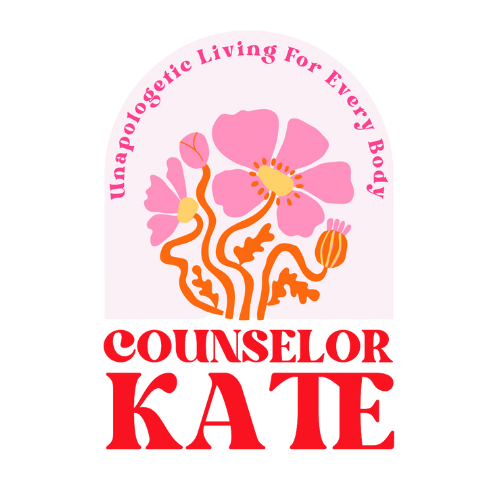
It’s time to ditch the eating disorder and start living your life.
Eating disorders are a life thief.
Does any of this sound familiar?
You’ve got a mile-long list of all the diets you’ve tried and “failed.” You can’t trust yourself with candy in the pantry. One slip-up with your food plan leads to self-loathing and punishment (binging, purging, or planning how you’ll compensate tomorrow).
On the flip side, perhaps you’ve been eating way less or over-exercising and people are beginning to say things about it. The thought of gaining weight is terrifying, and besides, you’re just trying to “get healthy.”
You’re a pro at body checking in the mirror, each side-to-side turn and skin pinch adds to shame about your reflection. Even though you tell your friends and kids they’re beautiful, it’s impossible to say something kind to your own body. And forget letting your partner see you naked with the lights on.
Either way, food, and body stuff makes you feel guilty, ashamed, irritated, self-conscious, and alone. I’m here to help you.
How do I know if it’s time to get help?
Recognizing the signs and symptoms of an eating disorder can be challenging, as they often manifest differently from person to person and may vary depending on the type of eating disorder.
You might not think you have an eating disorder — maybe you’re a chronic dieter who’s sick of feeling ashamed of your body. Either way, when the level of distress someone has about food and body image impacts their day-to-day life, it’s time to get support.
What kind of eating disorders do you treat?
It might sound weird to say, but I enjoy working with folks who have anorexia, binge eating disorder, and “otherwise specified” eating disorders. I’m great at what I do and I love helping people get better!
In our therapy sessions, you’ll receive personalized support to identify triggers, develop coping mechanisms, and build resilience against thoughts and behaviors that keep you stuck in your eating disorder. You can break free from the grip of anorexia and binge eating disorder. If you or someone you care about is struggling, reaching out to an eating disorder therapist can be the first step toward healing.
What is anorexia?
Anorexia nervosa is a complex mental health condition that is characterized by weight loss, an intense fear of gaining weight, and a distorted body image. It can affect people of all ages, genders, and body sizes. People with anorexia often have a compulsion to keep losing weight at all costs, despite medical conditions, fatigue, dizziness, mood changes, losing social connections, and comments from friends or family. It’s not a disease that’s cured just by eating more! It requires therapeutic support from specialists who can help people break free from what I call the “Eating Disorder Brain.”
Eating disorder therapy offers a supportive environment where you can explore the underlying factors contributing to the eating disorder. You will also learn coping strategies to have a healthier relationship with food and your body. When treating anorexia, I use utilize evidence-based approaches such as somatic experiencing (SE), cognitive-behavioral therapy (CBT), and acceptance and comment therapy (ACT) to address maladaptive thoughts and behaviors, promote self-awareness, and facilitate long-term healing.
What is binge eating disorder?
Binge eating disorder (BED) is a type of mental health condition. BED is characterized by recurrent episodes of consuming large quantities of food within a short time, typically accompanied by a sense of loss of control. Sometimes binging is followed by vows to go on a diet, restricting certain types of food, fasting, or excessive exercise.
Binging often brings up major feelings of guilt, shame, and distress. One minute you may feel very in control of food and the next you’re in the binge “zone,” checked out of your body and eating whatever your brain is hyperfocused on. Binge eating disorder can affect people of any age, gender, or background. Often, folks with BED have a history of food restriction or dieting that contributes to the binge cycle.
Treatment for BED often involves a combination of therapies. This includes non-diet nutrition support, somatic experiencing (SE), and cognitive-behavioral therapy (CBT) to address the underlying emotional, physical, and psychological factors contributing to binge eating behaviors. You can get off the binge-eating merry-go-round! I can help you.
Will I gain weight?
I don’t know. What I do know is that no one who has sought treatment for disordered eating was ever truly happy with their weight (even at its lowest). The tricky thing about disordered eating is that the bar always changes, so you’re always left striving for “perfect.” Bottom line: we have to scrap the bar altogether.
No matter where your body lands in recovery (my term for getting to a place of true healing), if you are taking care of your body it is going to support you the best it can at the fullest measure of health it can muster. Freedom from disordered eating is worth more than the number on the scale.
But I just want to get healthy. What’s so wrong with that?
Health is so much more than body size, shape or weight. If it was really about health, you wouldn’t be in a tailspin about your weight or jeans size. And if you could stop the disordered eating on your own, you wouldn’t need help.
Something brought you here because something about your relationship with food is causing you more distress than fulfillment. In this case, the disordered eating is causing you more pain than health and that’s worthy of getting support for.
What does eating disorder therapy look like?
We can do in-person eating disorder therapy in my Raleigh, NC office or via telehealth anywhere in North Carolina. We’ll begin by mapping your relationship with food and your body. For some, there’s a clear connection between an eating disorder and challenging family or trauma history. For others, we might do a little more digging to understand the function of disordered eating, whether that’s looking for control, hope, acceptance or something else.
Our sessions will look different every time. We’ll probably laugh a lot. There might be some tears. And I’m going to keep it real with you (I’m human, too). Some days we might talk about deep stuff and other times we might talk about something funny that happened on the way to therapy. In the midst of it all, I’ll help you learn ways to regulate your feelings and thoughts without needing the structure and control the eating disorder provided.
I’ve tried therapy already. How do I know if this will help?
Pat yourself on the back for already testing the waters with therapy. If you’ve done talk therapy with strategies like trying to change your thoughts, exposure therapy, role-playing new behaviors, checking in with your values, worksheets, self-help books, etc, etc, that tells me two things:
You’re not one to give up. You work hard. You’re curious.
You might benefit from something we call “bottom-up” strategies (aka strategies that help your brain and body regulate instead of just trying to think your way through issues). It’s the difference between knowing something intellectually and knowing something in our bones. You’re probably really good at the intellectual stuff, but it’s harder to really feel calm, steady, and regulated from your chin down.
Recovery is possible, and we’ll figure out the best approach for you. Click below to get started.
Getting started with eating disorder therapy in Raleigh, NC
Empower yourself with support by reaching out to Counselor Kate. My eating disorder therapy services are designed to provide compassionate guidance and personalized treatment options tailored to your needs. Take the first step towards healing and reclaim control over your well-being by following the steps below:
Schedule a consultation here so I can get to know you better.
Learn more about who I am.
Begin online eating disorder therapy or see me in person!
Other services I offer in North Carolina:
My goal is to provide compassionate support to help individuals process and release trauma stored in the body with trauma and somatic therapy. Rediscover a harmonious relationship with food and your body through my intuitive eating services!
Other services I provide:
-

Trauma Therapy
I provide counseling for eating disorders, trauma and anxiety in Raleigh, NC and virtually across North Carolina. Individual sessions are tailored to provide the support you need.
-

Intuitive Eating Coaching
Get off the diet merry-go-round and regain body trust by learning intuitive eating. Rediscover what hunger and fullness feel like. Trust yourself around food again.









